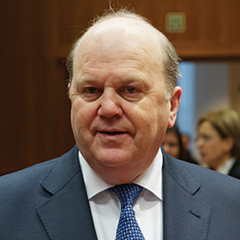An update on Ireland’s EU-IMF commitments
 Ireland is now half-way through its bailout programme. The EU and IMF remain happy with progress, but negotiations on debt reduction continue.
Ireland is now half-way through its bailout programme. The EU and IMF remain happy with progress, but negotiations on debt reduction continue.
It is now 18 months since Ireland signed up to its three year bailout programme. After the sixth review of the programme concluded on 26 April, Ministers Noonan and Howlin were keen to point out in a joint statement that the underlying deficit for 2011 was 9.4 per cent, ahead of the 10.6 per cent ceiling in the programme. “Our tax take is growing and we are on track to meet our 8.6 per cent deficit target in 2012,” they said.
The troika released a statement after the review which, while acknowledging that implementation is on track, highlighted continuing problems. “Economic growth is expected to remain modest in 2012, at around 0.5 per cent,” they stated. “The benefits of continued competitiveness gains are limited by relatively low trading partner growth, while domestic demand continues to decline and the banking sector faces difficult market funding conditions.”
Several requirements relating to the financial sector must be completed by the end of June. The Irish Life & Permanent (IL&P) group is to be fully recapitalised and an updated restructuring plan submitted to the troika. The Permanent TSB part of IL&P is to be split into a good bank-bad bank structure following full recapitalisation through government acquisition of Irish Life (for €1.3 billion).
Banks are to be assessed for asset quality, their data validated for consistency and their provisioning, income and loan impairment recognition practices reviewed. The Irish authorities must also work with the banks on their loan portfolio resolution strategies and systems. Draft rules for the creation and subsequent holding of liquidity buffers must be established in preparation for the new Capital Requirements Regulation, which comes into effect next January.
Credit unions have come under the spotlight. The report of the Commission on Credit Unions, published on 18 April, recommended a restructuring of the sector by the end of 2014. Fifty-one of 404 credit unions have less than the required amount of reserves (i.e. ten per cent of assets). A regulation compelling them to maintain an amount (to be determined) in the Central Bank’s deposit protection account and legislation governing the sector have been deferred until the third quarter.
Progress by the banks on implementing mortgage arrears resolution strategies is to be reported to the troika by the end of this quarter. The personal insolvency Bill is to be introduced in the Oireachtas by the end of June.
Other measures required include a strengthening of the electricity and gas sectors’ regulatory and market reform programme and a timetable for the sale of state assets (including any reforms that will be needed to execute this). Sales are expected to commence in 2013.
Publication of the fiscal responsibility Bill, which will enshrine multi-annual expenditure limits and put the Fiscal Advisory Council on a statutory footing, has been deferred until the third quarter. The Department of Social Protection must complete an evaluation of measures concerning recipients of job seekers’ payments who do not attend employment activation interviews.
As expected, the Department of the Environment finalised new planning guidelines (introducing three retail floorspace cap limits for the country). Minister Phil Hogan announced that water responsibility would transfer from local authorities to Irish Water, a subsidiary of Bord Gáis. However, the implementation plan being developed by Bord Gáis, required by the end of April, has not been completed yet.
The Department of Jobs, Enterprise and Innovation must ensure that the Competition Authority is sufficiently resourced. Minister Bruton has said that the authority will receive an additional ten staff to its current 39.1 whole-time equivalents.
Negotiations are ongoing with the troika on increasing from a third the proportion of proceeds from the sale of state assets to be invested into economic stimulus, and on the re-engineering (and cost reduction) of the €3.06 billion annual promissory note used to fund the Irish Bank Resolution Corporation.





